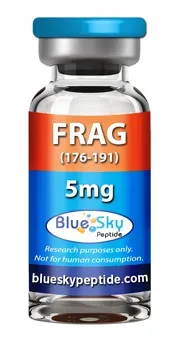Fragment 176-191 is a synthetic peptide analog of human growth hormone (hGH) with a molecular weight of 1812 g/mol. This peptide consists of 16 amino acids from the C-terminus of hGH, spanning positions 176 to 191, and includes a substitution of tyrosine to phenylalanine at position 191, enhancing its lipid metabolism properties.1 Functionally, Fragment 176-191 mimics the action of endogenous growth hormone-releasing hormone (GHRH), also known as growth hormone-releasing factor (GHRF), by binding to receptors in the pituitary gland and triggering the release of growth hormone (GH).2
Lipolytic Properties
Fragment 176-191 has demonstrated significant lipolytic properties in in vitro studies, leading to its reputation as the "lipolytic fragment." In a genetically engineered mouse model with larger fat stores, the peptide enhanced fat loss. However, this effect was absent in mice lacking the beta-3 adrenergic receptor (ADRB3), confirming that the peptide’s fat-reducing function is mediated through this receptor.3 These findings suggest that Fragment 176-191 may hold potential as a future treatment for obesity.
Diabetes Studies
Additionally, Fragment 176-191 has been explored as a potential therapy for diabetes. Animal studies indicate that the peptide gradually increases insulin levels to reduce blood sugar, without affecting insulin-like growth factor 1 (IGF-1) levels or carbohydrate metabolism—effects typically associated with hGH.4,5 While the peptide shows promise, further in vitro research is necessary to confirm these findings and explore its full potential in these areas.
Product Information
Blue Sky Peptides Fragment 176-191 is supplied as a lyophilized white powder at a concentration of 5 mg/vial.
Important Notice
This product is intended for in vitro scientific research only. It is not approved for human or veterinary use under any circumstances.
References
- Habibullah MM, Mohan S, Syed NK, et al. Human growth hormone fragment 176-191 peptide enhances the toxicity of doxorubicin-loaded chitosan nanoparticles against MCF-7 breast cancer cells. Drug Des Devel Ther. 2022;16:1963-1974.
- Harvey S, Martinez-Moreno CG. Growth hormone: Therapeutic possibilities—An overview. Int J Mol Sci. 2018;19(7):2015.
- Heffernan M, Summers RJ, Thorburn A, et al. The effects of human GH and its lipolytic fragment (AOD9604) on lipid metabolism following chronic treatment in obese mice and β3-AR knock-out mice. Endocrinology. 2001;142(12):5182-5189.
- Ng FM, Bornstein J. Hyperglycemic action of synthetic C-terminal fragments of human growth hormone. Am J Physiol. 1978;234(5):E521-526.
- Stier H, Vos E, Kenley D. Safety and tolerability of the hexadecapeptide AOD9604 in humans. J Endocrinol Metab. 2013;3(1-2):7-15.



